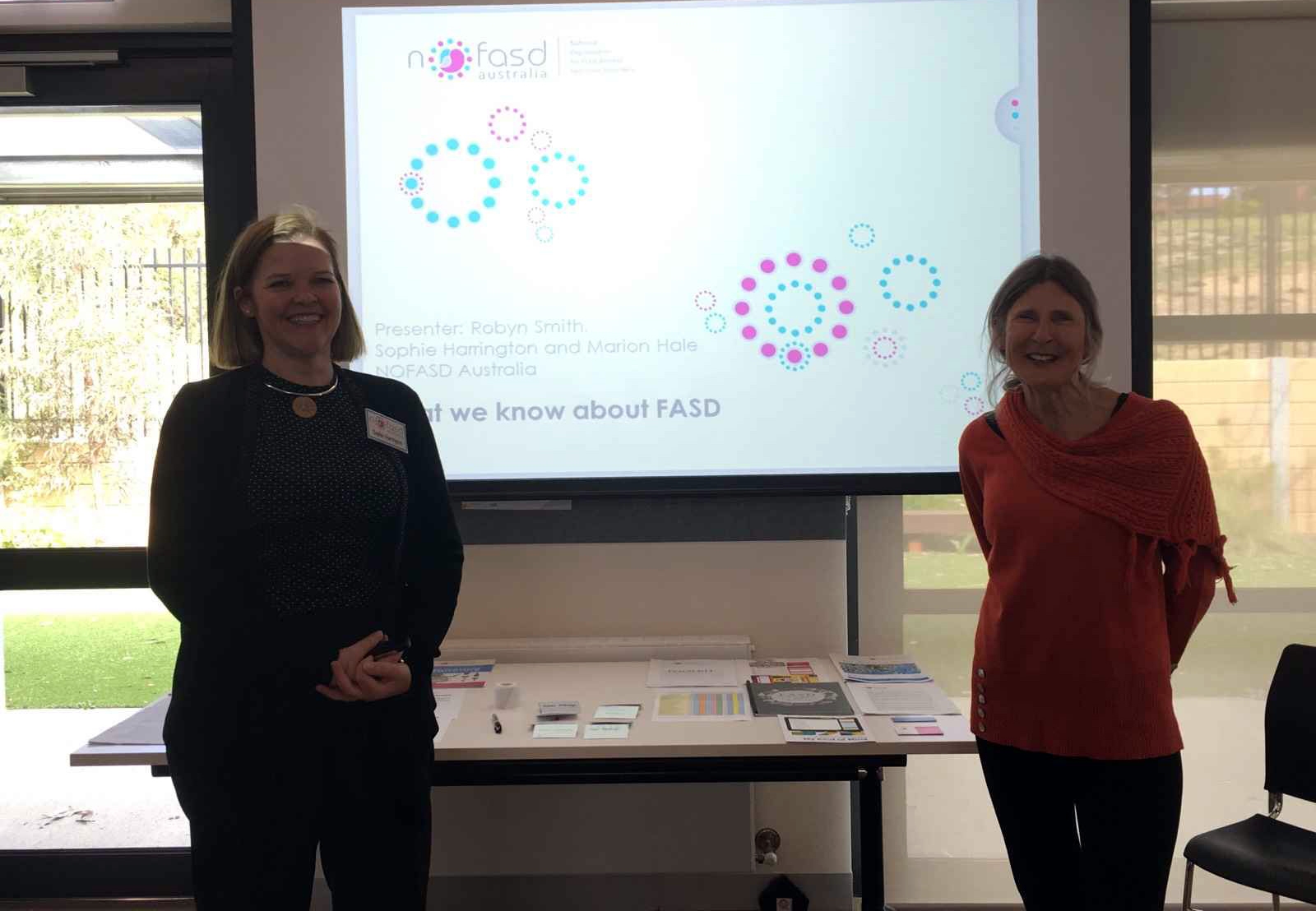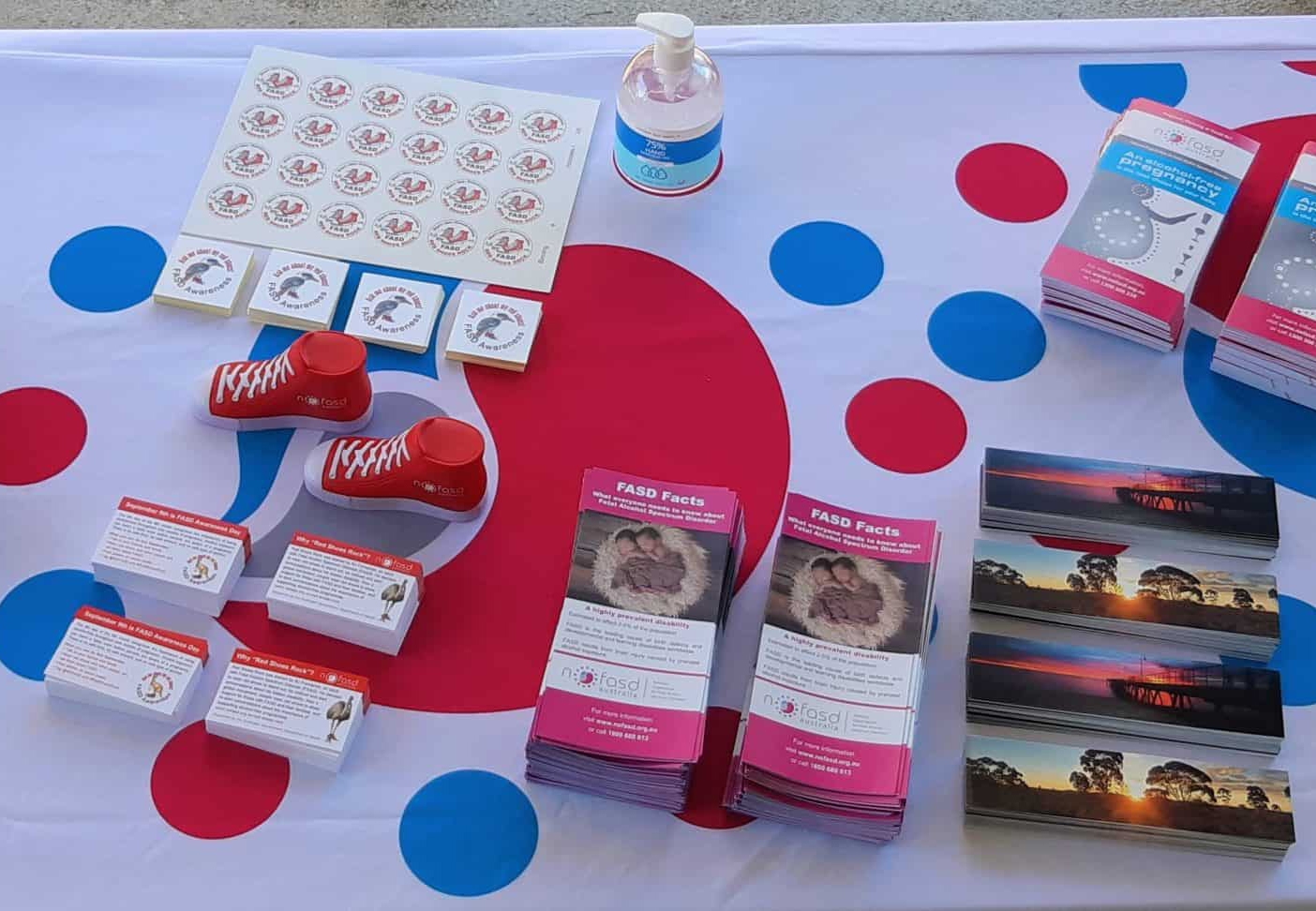This site may not work properly using older versions of Edge and Internet Explorer. You should upgrade your browser to the latest Chrome, Firefox, Edge, Safari, or any other modern browser of your choice. Click here for more information.
Your Stories
This is where we tell your stories, cover topical issues and promote meaningful initiatives.
Fetal Alcohol Spectrum Disorder Myth Busting with NOFASD Australia
CRANAplus catches up with Robyn Smith, the Helpline Manager for the National Organisation for Fetal Alcohol Spectrum Disorder (NOFASD), to tackle four common Fetal Alcohol Spectrum Disorder myths.

Robyn, right, presenting on FASD.
- Myth #1: “You shouldn’t put a label on it”
-
“Sometimes paediatricians, doctors, GPs or others may say ‘you don’t want to put a label on that child’, but I think it’s detrimental not to seek support for that child as they’re growing up,” Robyn Smith says.
“I’ve spoken to a lot of adults who have FASD and they’ve had a huge amount of relief out of getting a diagnosis… They tell us that as a child growing up they felt like they were ‘dumb’ and ‘stupid’ and they gave this label to themselves. Therefore, it is so important for them to realise their brains think differently to other people, and they need support with tasks.
“As a matter of fact, individuals with FASD, some of them have a normal range IQ,” Ms Smith adds.
- Myth #2: That FASD is necessarily a visible disability
-
“Alcohol is the only substance that causes three particular facial features, called sentinel facial features” Ms Smith says. “The three features are small eyes (specifically, short palpebral fissure length), a smooth philtrum, and a very thin top upper lip.
“The facial features are only formed on four days of the pregnancy, which is day 17 to day 20. If there’s no alcohol consumed in these four days, then there’s no facial features, which means that less than 20 per cent of individuals with FASD have facial features. It is often referred to as an invisible disability for this reason.”
Ms Smith says the confusion is partly caused by changes to diagnosis in 2016. The three or four different diagnoses that used to exist have now been simplified to FASD with three sentinel facial features and FASD with less than three sentinel facial features – but she stresses that despite the reduction, there is increased recognition of the disorder’s diversity.
“The operative word is spectrum,” she says, “because there’s no two the same; because people living with FASD can be polar opposites, actually.”
- Myth #3: That limited drinking during pregnancy is safe
-
“We have had people say, ‘my mother drank when she was pregnant with me and I’m fine’,” Ms Smith says.
“That could be a debatable fact. You might be. But you never know what your full potential was. Maybe if your mother hadn’t consumed a few of those alcoholic beverages… we don’t know. There is no known safe limit for consumption.
“Not every alcohol-exposed pregnancy results in FASD. It is one out of 13 that results in FASD… Do you want that one to be your baby? Do you want to take that risk? It’s like playing Russian Roulette.
“A recent study found that a woman had one alcoholic drink each night over her pregnancy and she had twins. When they were born, one twin had FASD, the other didn’t. It’s the epigenetics of the child and the susceptibility.
“This is why NOFASD supports the Australian National Health and Medical Research Council (NHMRC) guidelines which advise that no alcohol should be consumed during any stage of a pregnancy.
“This includes the time before a pregnancy is identified and until breast-feeding is discontinued.”
- Myth #4: That FASD is specific to certain groups of people
-
“It is not a low socio-economic issue or an Indigenous problem,” Ms Smith says. “Alcohol is part of the Australian culture. It’s nothing to come home from work and to have a glass of wine while you’re cooking tea, and another glass after when you’re eating. We use it to celebrate, to commiserate, to have a good time. It is so commonly used in every walk of life.”
On the topic of whether it is more prevalent in rural or remote settings, Ms Smith says “It’s very much a possibility, but there hasn’t been any study on that.”
She points out that only two studies have been done on prevalence in Australia, one in Banksia Hill Detention Centre, one in Fitzroy Crossing.
“There was a Senate Inquiry into FASD [in 2020],” she adds. “One of the outcomes of that is that hopefully we will have a mainstream prevalence study here, rather than a study of a special population group like young people in detention”.
Even now, though, studies in comparable jurisdictions like Canada and alcohol consumption statistics in Australia suggest the national rate is high.
“There was a prevalence study done in Canada, in 2018, which found that four per cent of the population there had FASD,” she says. “When you compare the statistics for that same year of how much alcohol was consumed, Australia’s consumption was much higher.
“With those results, you can estimate that at least 2 to 5 per cent of the Australian population would be living with FASD. This means that there’s more people affected by FASD than by autism, spina bifida, cerebral palsy, Down syndrome and SIDS combined.”
FASD Resources
NOFASD Australia (The National Organisation for Fetal Alcohol Spectrum Disorder) operate a telephone helpline for clients, parents and service providers. Contact 1800 860 613 for more information on the best way to work with, and support individuals living with FASD, including locating the nearest place for diagnosis.
The organisation also has a wide range of resources available online, including a parent toolkit, FASD fact sheets, brochures for doctor’s surgeries, and a FASD checklist for reference during a doctor’s appointment seeking diagnosis.

NOFASD Resources.
NOFASD Australia resources also include FASD advice cards for parents to distribute to bystanders during a sensory overload, as well as resources for specific professionals such as police officers and teachers.
Many resources are available to be sent out free of charge. Simply contact NOFASD Australia through their ‘contact us’ page.
NOFASD Australia also provide a free Australian Foundations in FASD Online Course that may be of interest to readers.
Head to nofasd.org.au for more information.